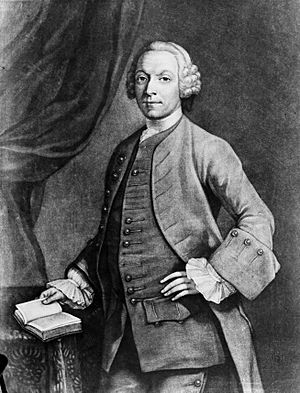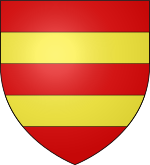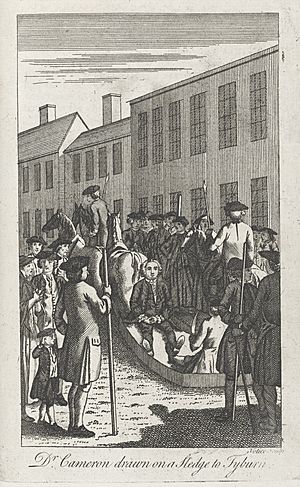Archibald Cameron of Lochiel facts for kids
Archibald Cameron of Lochiel (born 1707 – died 7 June 1753) was a Scottish physician and an important leader in the Jacobite rising of 1745. He was the personal doctor for Charles Edward Stuart, also known as Bonnie Prince Charlie. Archibald was the younger brother of Donald Cameron of Lochiel, who was called the Gentle Lochiel. Donald led Clan Cameron during the uprising. Archibald Cameron was the last Jacobite person to be executed for treason in Britain. This happened at Tyburn on 7 June 1753. People sometimes remember him as Doctor Archie.
Contents
Early Life and Education
Archibald Cameron was born in 1707 at Achnacarry Castle. He was the sixth child of John Cameron, Lord Lochiel and Isobel Cameron.
His father, Lord Lochiel, had been part of an earlier uprising in 1715 that failed. Because of this, his father had to live outside Scotland, first in Paris and then in Boulogne. Archibald Cameron's older brother was Donald Cameron of Lochiel. Donald became the leader of Clan Cameron because their father was away. He is known in history as "The Gentle Lochiel."
Archibald Cameron first studied law at the University of Glasgow. But he later changed his mind and decided to study medicine at the University of Edinburgh. He continued his medical studies in other famous places, like the Sorbonne in Paris and the University of Leiden in the Netherlands. After finishing his studies, he returned to the Scottish Highlands. He married his cousin, Jean Cameron, from Lochaber, and they had seven children.
The 1745 Uprising
When Charles Edward Stuart (Bonnie Prince Charlie) first arrived in Scotland, Archibald Cameron was sent by his brother to Loch nan Uamh. His job was to tell the Prince that his plan might not work and to convince him to go back to France. However, Prince Charles managed to persuade Cameron to join him instead. Soon after, the Cameron family and their clan joined the Prince's armed revolt.
Archibald Cameron first took part in a military action in August 1745. He helped lead an attack on Ruthven Barracks. During the fighting that followed, Cameron seems to have been promoted to a high rank, like a lieutenant colonel, in his brother's clan regiment. Some stories say he was a peaceful person who only offered his medical skills. But this is probably not true. Cameron was actually wounded during the Battle of Falkirk in January 1746. He also performed surgery on his brother after he was badly injured at the Battle of Culloden.
The defeat at Culloden meant the end of the Jacobites' hopes. Both Cameron brothers and their father became fugitives, meaning they were hiding from government troops. After their family home, Achnacarry House, was burned, the Cameron family hid in Badenoch. Even though it was dangerous, Prince Charles wanted to meet The Lochiel. Archibald Cameron was sent to Loch Arkaig to bring the Prince to their hiding place on September 3. The whole group then moved to Ben Alder, where Ewen MacPherson of Cluny was hiding the Loch Arkaig treasure. On September 13, 1746, at Ben Alder Castle, they heard that French ships were waiting at Loch nan Uamh. On September 19, the whole group escaped to France on these ships.
Betrayal and Capture
While living in France, Cameron continued to serve Prince Charles. He traveled with him to Madrid in 1748 and secretly returned to Scotland in 1749. In 1753, he was sent back to Scotland again. His mission was to get money from Loch Arkaig and to take part in a secret plan.
However, while he was secretly staying at Brenachyle by Loch Katrine, he was betrayed. Many people believed that MacDonell of Glengarry, known as "Pickle the spy," was the informant. But new research suggests this was not true. Research by Carrie O'Connor shows that it was actually Chief Normand McLeod who betrayed Dr. Cameron.
Here is part of a letter from the National Archives (shared by Carrie O'Connor). It was written on January 27, 1753, by Chief Normand McLeod. In it, he tells the Duke of Newcastle that Cameron had arrived in Scotland.
My Lord Duke
as your Grace ordered me
I here Send the names of the Rebells that
Came Lately to the Highlands of Scotland
I am with The outmost respect
my Lord Duke
your most obedient &
most humble Servant
Normand Macleod
London Jan 27th 1753
Macdonald of Lochgary
Doctor Cameron Brother to Locheil
Robison of Blarfitty
Macdonald Brother of Kin Loch moidart


Cameron was arrested and accused of high treason for his part in the 1745 uprising. He was first held in Edinburgh Castle and then taken to Tower Hill in London. His wife was expecting their eighth child at the time. Many people, including his wife, asked for him to be spared because he was known as a "gentle and kind" doctor.
Execution and Burial
On June 7, 1753, Cameron was taken on a sledge to Tyburn, where he was executed. His body was buried in the Savoy Chapel, in Westminster. He was the last Jacobite to be given the death penalty. In his final writings from prison, he still declared his strong loyalty to the House of Stuart and his religious beliefs.
Cameron was buried in the underground vaults of the Savoy Chapel, which is near the Strand in London. A priest named Rev. John Wilkinson, who was thought to have Jacobite sympathies, reportedly paid for the burial himself. There used to be a stained glass window honoring Cameron, but it was later destroyed. Now, a brass plaque marks the event.
Legacy
How People Remember Him
Archibald Cameron is generally seen as a kind and good person. His betrayal and execution in 1753 were greatly regretted by many. According to James Browne, in his book A History of the Highlands, "his fate was generally pitied." His kindness was shown when he stopped prisoners from being executed after the Battle of Prestonpans and when he treated a wounded enemy officer. It's not fully clear if he ever fought in battles. Some say he probably did, while others insist he was a pacifist and only worked as a doctor. People were also upset about the cruel way and place he was executed. Tyburn was usually where common criminals were executed, not noblemen. Noblemen were traditionally executed at Tower Hill, where, for example, Lord Lovat was beheaded in 1747.
There have been many ideas about why Cameron was executed. Most people believe that his public execution was meant as a final warning to the Jacobite cause and to stop any future uprisings.
 | George Robert Carruthers |
 | Patricia Bath |
 | Jan Ernst Matzeliger |
 | Alexander Miles |




